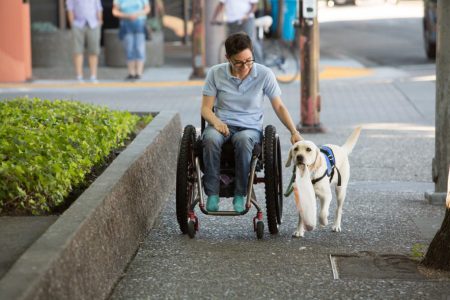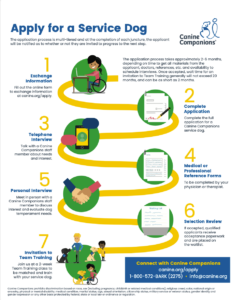
Answer
Canine Companions trains service dogs for adults, children and veterans and facility dogs who work with professional in a visitation, education or healthcare setting. Learn more here.
Additionally, in 2020, Canine Companions launched a small pilot program to certify certain eligible dogs as therapy dogs. Learn more here.
Finally, Canine Companions works closely with partner agencies to find working placements for dogs that are not suitable for placement as a service or facility dog. Our dogs have gone on to do everything from diabetic alert, search and rescue, explosives detection and more!
Answer
A Canine Companions service dog can not only open doors, pick up dropped items and turn on the lights; it can also increase confidence and independence.
Answer
Since 2018, Canine Companions is proud to place service dogs with United States Armed Forces veterans with service-connected post-traumatic stress disorder (PTSD). Dogs are trained in tasks including nightmare interruption, turning on lights, retrieving items, anxiety interruption and supporting their handler in crowded public situations. Currently, this program is only offered at certain regional training centers. Please click here for more information.
Answer
No, Canine Companions service dogs and all follow-up services are provided free of charge to the recipient. Students are responsible for their transportation to and from the regional training center, their meals during Team Training and depending on the training center in your regional area, the cost of staying in a hotel. Once matched with a dog, graduates of the program are responsible for costs associated with care of the assistance dog including food, grooming and routine veterinary expenses.
Answer
Canine Companions uses Labrador Retrievers, Golden Retrievers, and crosses of the two breeds.
Answer
Canine Companions service dogs are highly trained to perform a limited set of practical tasks geared towards assisting individuals with physical disabilities or veterans with PTSD lead more independent lives. Although our graduates find an incredible depth of emotion in the bond between them and their dog beyond just the working tasks, Canine Companions does not place dogs with individuals for the primary benefit of emotional comfort or social support.
Some of the tasks they are trained to do:
- Retrieve and deliver dropped items.
- Tug to open a door or drawer.
- Pull a laundry basket, or help with a sock or jacket.
- Push with their nose to shut a drawer.
- Open a door with an automatic push plate.
- Pull a lightweight manual wheelchair over a short distance.
- Turn lights on and off.
- Our hearing dogs have a different skill set, primarily involving alerting and orienting recipients to sounds.
- Our service dogs for veterans with PTSD are trained in nightmare and anxiety interruption, among other skills.
Answer
Canine Companions dogs are NOT trained to do the following:
- Guide work for the blind.
- Seizure or diabetic alert/response.
- Mobility assistance, including balance work.
- To recognize and/or manage undesirable human behavior or provide supervision, navigation, or safety from environmental hazards.
- Respond aggressively or provide personal protection.
Application Process
Answer
People with physical or developmental disabilities, adults who are Deaf or hard of hearing, as well as professionals working in health care, visitation, educational or criminal justice settings who can demonstrate that a service dog will enhance their independence or their quality of life are qualified to apply.
Click here to learn more about whether a service dog is right for you.
Answer
The application process, as well as all lectures, individual instruction and written class materials for the pairing process (Team Training), are in English. We can accommodate specific communication needs, including providing interpreters for our hearing dog students during Team Training and other events.
Answer
Individuals applying for a service dog must be at least 18 years old with an established, stable home life. We find those who are 25 years of age and up are typically most suitable for a service dog. Children must be at least five years old to be considered for a service dog.
Answer
Canine Companions has a comprehensive and interactive application process. Before we begin, we first exchange basic information to determine whether the program will be a good fit. At each step of the application process, experienced Canine Companions staff review an applicant’s need and qualifications to determine whether or not the applicant will move on. Click on the graphic below for more information about the application process.
Answer
All inquiring individuals should receive a response from Canine Companions within 4-6 weeks.
Answer
Once on the list, the wait time varies greatly between categories and based on each individual’s needs. Typically, service dog candidates have the longest wait, as dogs with very specific temperaments are needed for these placements.
Training Canine Companions Service Dogs
Answer
Each Canine Companions service dog spends the first year-and-a-half with a volunteer puppy raiser to learn basic tasks and socialize in public and private settings. Once the puppy raiser returns the puppy to Canine Companions, the dog enters professional training at a regional training center for five to nine months, where they learn the advanced commands that support the work of a service dog.
Answer
It takes an exceptional dog to graduate as a service dog, and not every dog is suitable. All dogs must be highly proficient in the trained skills and tasks. In addition, Canine Companions dogs receive rigorous medical and temperamental screening to ensure that every dog that graduates will be healthy, happy and appropriate in their role.
Answer
Approximately two years old.
Matching and Beyond
Answer
Once a dog has completed professional training, it is ready to be matched with a person with a disability. The team is matched at one of our regional training centers during Team Training, a two-week group class. During Team Training, students learn to manage the service dog’s behavior, to direct the dog to respond to commands it has learned, and to assume responsibility for maintaining the health and well-being of the dog.
Answer
Canine Companions has a comprehensive and participatory program to ensure the ongoing success of its working teams. Throughout the working life of the dogs, graduates periodically return to campus with their dogs for public certification, workshops, seminars and reunions.
In addition, Canine Companions instructors and graduates communicate on an on-going basis through correspondence, reports and by providing advice via phone and email. Instructors also travel into the field to conduct workshops and to resolve specific training or behavioral problems in the graduate’s home and/or workplace environment.
Canine Companions maintains ownership of the service dog even after placement is made. A graduate is personally and financially responsible for the service dog’s care and maintenance, including food and veterinary services.

